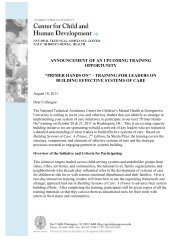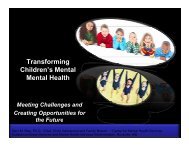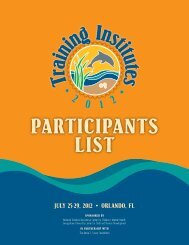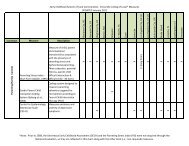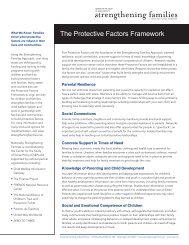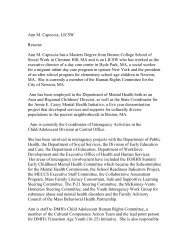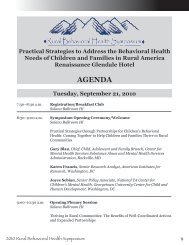Training Institutes 2012 - National Technical Assistance Center for ...
Training Institutes 2012 - National Technical Assistance Center for ...
Training Institutes 2012 - National Technical Assistance Center for ...
You also want an ePaper? Increase the reach of your titles
YUMPU automatically turns print PDFs into web optimized ePapers that Google loves.
INSTITUTES<br />
INSTITUTE #22 8:30 AM FRIDAY • 1:30 PM SATURDAY • SANIBEL 1-2-3<br />
Improving Services and Supports <strong>for</strong> Youth Who Are Lesbian, Gay, Bisexual, Transgender,<br />
Questioning, Intersex, 2-Spirit (LGBTQI2-S) and Their Families<br />
OBJECTIVES—Participants will learn:<br />
1. To describe the most recent literature reflecting the experiences of LGBTQI2-S youth and their families, including<br />
challenges and assets, and engagement with youth-serving systems<br />
2. How to apply recommended practices and strategies <strong>for</strong> delivering culturally and linguistically competent services<br />
and supports to LGBTQI2-S youth and their families<br />
3. How to guide the development of community-level policies, programs, practices and activities to improve the lives<br />
of LGBTQI2-S youth and their families<br />
4. To use practical resources, tools and practice guidelines to improve services and supports <strong>for</strong> LGBTQI2-S youth and<br />
their families and enhance positive outcomes<br />
This Institute will focus on providing effective services and supports <strong>for</strong> LGBTQI2-S youth and their families,<br />
providing in<strong>for</strong>mation, recommended practices, tools, and interventions that are designed to promote social inclusion,<br />
reduce disparities in behavioral health services and supports, and improve outcomes <strong>for</strong> this critically underserved<br />
population of youth and their families. Faculty will highlight specific approaches, such as individual and organizational<br />
assessment, standards of care, responding to the needs of particular populations (e.g., gender noncon<strong>for</strong>ming and<br />
transgender youth, two-spirit youth), and developing social marketing materials to enhance help-seeking behavior and<br />
social inclusion. Many of the strategies are based on a new book, “Improving Emotional and Behavioral Outcomes <strong>for</strong><br />
LGBT Youth: A Guide <strong>for</strong> Professionals.”<br />
Specific topics to be covered include:<br />
• Key LGBTQI2-S populations and their individualized service needs, particularly within youth-serving sectors (e.g.,<br />
education, child welfare, residential care)<br />
• Key challenges that LGBTQI2-S youth may experience, including stigma, bias, violence, and family/peer rejection, as<br />
well as accompanying behavioral health concerns (e.g., substance abuse, suicide attempts, anxiety)<br />
• How to use a cultural and linguistic competence as a framework <strong>for</strong> addressing the needs of LGBTQI2-S youth and<br />
their families<br />
• How to implement 10 standards of care <strong>for</strong> LGBTQI2-S youth<br />
• How to be responsive to the needs of gender noncon<strong>for</strong>ming and transgender youth<br />
• Applying a tool <strong>for</strong> assessing individual and organizational competence relative to LGBTQI2-S<br />
• Using video resources as a tool <strong>for</strong> building awareness and sensitivity to behavioral health challenges experienced by<br />
LGBTQI2-S youth<br />
• Developing social marketing materials to enhance help-seeking behavior and social inclusion <strong>for</strong> LGBTQI2-S youth<br />
and their families<br />
Participants will view short video clips and participate in a definition activity. In addition, participants will receive a<br />
flash drive with more than 100 resources and tools to support their implementation of culturally and linguistically<br />
competent services and supports <strong>for</strong> LGBTQI2-S youth and their families. The faculty team <strong>for</strong> this session will offer<br />
the perspectives of a federal agency, a researcher, a technical assistance provider, and youth.<br />
MODERATOR/PRESENTER: Sylvia Fisher, Ph.D., Director, Office of Research and Evaluation, Office of Planning,<br />
Analysis and Evaluation, Human Resources and Services Administration, Rockville, MD<br />
Tessa Cayce, Youth Advocate, <strong>National</strong> Workgroup to Address the Needs of Children and Youth Who Are LGBTQI2-S and<br />
Their Families, Monmouth County, NJ<br />
Kathy Lazear, M.A., Social and Behavioral Researcher, Department of Child & Family Studies, Louis de la Parte<br />
Florida Mental Health Institute, College of Behavioral & Community Sciences, University of South Florida, Tampa, FL<br />
Jeffrey Poirier, Ph.D. Candidate, M.A., P.M.P., Senior Researcher, Cultural Competence Action Team Member and<br />
LGBTQI2-S Learning Community Co-Lead, <strong>Technical</strong> <strong>Assistance</strong> Partnership <strong>for</strong> Child and Family Mental Health,<br />
American <strong>Institutes</strong> <strong>for</strong> Research,Washington, DC<br />
54 <strong>Training</strong> <strong>Institutes</strong> <strong>2012</strong>



